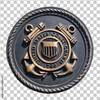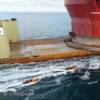European Union plans to avoid a repeat of the recent saga of the leper-tanker Castor are well advanced, the European Commission's head of maritime safety said. With a 60-ft. crack in its deck, Castor was refused refuge by Morocco, Gibraltar and Spain as it sailed through storms in search of sheltered water in which to offload its 29,500 ton gasoline cargo.
"The Castor has shown that there was no system (of refuge for stricken ships)," European head of maritime safety Willem de Ruiter said. He said that under proposals put forward by the European Commission, EU member states would be obliged to develop national plans for ports of refuge. The ports would have to be properly equipped to deal with maritime emergencies. De Ruiter said the safety system was set to improve, and with it the quality of the maritime industry.
"I'm not a prophet, but what I see is clear determination by many maritime administrations, such as the IMO (shipping's regulatory body), a general drive towards quality," he said. "The safety net is getting finer and Europe is playing the role of the locomotive."
A cornerstone of the European Commission's initiative is the construction of a pan-European traffic monitoring system. The system would rely on all ships entering European waters carrying transponders, which would use satellite and high-frequency radio to relay the ship's position and cargo details to a chain of onshore centers. "We need a network of coastal stations receiving information, and we want to build up a picture of traffic moving around the coast," said De Ruiter.
It is a system that one tanker industry source described as "aviation-style traffic control", a tag that De Ruiter does not fully accept. "The word traffic-control can be used, but we should not draw a parallel with aviation, where the control is very active. We don't have this picture in mind," he said. He said proposals to ban ships with hazardous cargoes from leaving port during severe storms were still at an "early stage," following one "exploratory round" of talks.
Another goal of the European Commission's safety initiative is increasing the transparency of the industry, said De Ruiter. It plans to achieve this by harnessing the power of the internet, putting all ships details and histories on a single publicly-accessible database called Equasis (www.equasis.org). "The aim is to make charterers (the oil majors and traders) think twice before putting their dangerous cargoes on these (sub-standard) ships," said De Ruiter. "They can no longer say they didn't know."
De Ruiter said that the EU would work with the U.S. Coast Guard and with Japanese maritime authorities to build a global picture of ships' safety records.
Critics have said that the European Commission's safety initiative would simply push the sub-standard operators into Asia, Africa and Latin America. But de Ruiter said he hoped the EC's plans would have far-reaching benefits around the globe. "We're not a world government, nor should we try to be," said De Ruiter. "But for sub-standard operators life is getting more difficult." - (Reuters)
Subscribe for
Maritime Reporter E-News
Maritime Reporter E-News is the maritime industry's largest circulation and most authoritative ENews Service, delivered to your Email five times per week













